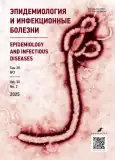Necrotizing pneumonia in a three-year-old child: a case report
- Authors: Bulatova A.K.1,2, Nikolaeva I.V.1, Khamidullina Z.L.2, Amerkhanov N.Z.3, Murtazaliev I.Y.3
-
Affiliations:
- Kazan State Medical University
- Professor A.F. Agafonov Republican Clinical Infectious Diseases Hospital
- Republican children clinical hospital
- Issue: Vol 30, No 2 (2025)
- Pages: 137-144
- Section: Case reports
- Submitted: 05.03.2025
- Accepted: 24.06.2025
- Published: 02.09.2025
- URL: https://rjeid.com/1560-9529/article/view/676880
- DOI: https://doi.org/10.17816/EID676880
- EDN: https://elibrary.ru/NKPXLX
- ID: 676880
Cite item
Abstract
Community-acquired pneumonia remains a leading cause of morbidity and mortality among children. One of the most serious complications of community-acquired pneumonia is pulmonary tissue destruction which may result in lung abscess, pleural empyema, and other pathological conditions. The key etiologic agents of necrotizing pneumonia are Streptococcus pneumoniae (serotypes 3 and 19A) and Staphylococcus aureus. Other potential pathogens include Haemophilus influenzae, Aspergillus spp., Mycobacterium tuberculosis, Legionella pneumophila, Klebsiella pneumoniae. Necrotizing pneumonia should be suspected in patients with persistent fever and inflammatory changes in laboratory blood tests despite ongoing antibacterial therapy.
This article describes a case of necrotizing pneumonia in a 3-year-old child caused by mixed infection with S. pneumoniae, Mycoplasma pneumoniae and K. pneumoniae. The patient experienced fever for 15 days without signs of respiratory failure. Blood tests revealed pronounced inflammatory changes, including leukocytosis up to 21.9 × 109/L, neutrophilia up to 82.9%, and elevated C-reactive protein up to 189.9 mg/L. Combined therapy with cephalosporins and macrolides was ineffective. Contrast-enhanced chest computed tomography performed on day 13 of disease demonstrated a large area of pulmonary tissue destruction with irregularly thickened walls in segments S VI–S IX of the right lower lobe. K. pneumoniae was isolated from sputum, S. pneumoniae antigen was detected in urine, and IgM antibodies to M. pneumoniae were identified in serum. Antibacterial therapy with linezolid, aminoglycosides, and β-lactam/β-lactamase inhibitor combinations (“protected aminopenicillins”) resulted in clinical improvement, and the patient was discharged on day 24 of disease.
This case demonstrates the potential for necrotizing pneumonia to develop due to co-infection with S. pneumoniae, M. pneumoniae and K. pneumoniae. These findings should be considered when adjusting ineffective antibacterial therapy in this condition.
Full Text
About the authors
Asiya Kh. Bulatova
Kazan State Medical University; Professor A.F. Agafonov Republican Clinical Infectious Diseases Hospital
Author for correspondence.
Email: Asiyakhaertynova@gmail.com
ORCID iD: 0000-0002-6167-1882
SPIN-code: 4490-1675
MD, Cand. Sci. (Medicine)
Russian Federation, 49 Butlerov st, Kazan, 420111; KazanIrina V. Nikolaeva
Kazan State Medical University
Email: irinanicolaeva@mail.ru
ORCID iD: 0000-0003-0104-5895
SPIN-code: 4103-5663
MD, Dr. Sci. (Medicine), Professor
Russian Federation, 49 Butlerov st, Kazan, 420111Zulfiya L. Khamidullina
Professor A.F. Agafonov Republican Clinical Infectious Diseases Hospital
Email: zulfiya.hami@gmail.com
ORCID iD: 0000-0002-9056-8964
SPIN-code: 3416-9257
Russian Federation, Kazan
Niyaz Z. Amerkhanov
Republican children clinical hospital
Email: niyaz.amerkhanov@tatar.ru
ORCID iD: 0000-0003-3779-8135
SPIN-code: 9603-4631
Russian Federation, Kazan
Ibrahim Yu. Murtazaliev
Republican children clinical hospital
Email: Ibragim.Murtazaliev@tatar.ru
ORCID iD: 0009-0001-6823-0553
Russian Federation, Kazan
References
- Baranov AA, Kozlov RS, Namazova-Baranova LS, et al. Community-acquired pneumonia in children >3 months: Clinical guidelines. Moscow; 2022. (In Russ.) Available from: https://cr.minzdrav.gov.ru/view-cr/714_1 EDN: SYJQMF
- Tolstova EM, Zaytsev OV, Besedina MV, et al. A contemporary view of the problem of destructive pneumonia in children. Meditsinskiy Sovet = Medical Council. 2023;17(1):28–33. doi: 10.21518/ms2023-025 EDN: WRTXZM
- Kapania EM, Cavallazzi R. Necrotizing pneumonia: a practical guide for the clinician. Pathogens. 2024;13(11):984. doi: 10.3390/pathogens13110984 EDN: DFMAEY
- Vecherkin VA, Toma DA, Ptitsyn VA, Koryashkin PV. Destructive pneumonias in children. Russian Journal of Pediatric Surgery, Anesthesia and Intensive Care. 2019;9(4):108–115. doi: 10.30946/2219-4061-2019-9-3-108-115 EDN: ALNVIY
- Lemaître C, Angoulvant F, Gabor F, et al. Necrotizing pneumonia in children: report of 41 cases between 2006 and 2011 in a French tertiary care center. Pediatr. Infect. Dis. J. 2013;32(10):1146-1149. doi: 10.1097/INF.0b013e31829be1bb
- Chen Y, Li L, Wang C, et al. necrotizing pneumonia in children: early recognition and management. J. Clin. Med. 2023;12(6):2256. doi: 10.3390/jcm12062256 EDN: XNFZHI
- Wang RS, Wang SY, Hsieh KS, et al. Necrotizing pneumonitis caused by Mycoplasma pneumoniae in pediatric patients: report of five cases and review of literature. Pediatr. Infect. Dis. J. 2004;23(6):564-567. doi: 10.1097/01.inf.0000130074.56368.4b
- Wang X, Zhong LJ, Chen ZM, et al. Necrotizing pneumonia caused by refractory Mycoplasma pneumonia pneumonia in children. World J. Pediatr. 2018;14(4):344–349. doi: 10.1007/s12519-018-0162-6 EDN: FACYBO
- Zaitsev AE, Kurbatova EA, Egorova NB, et al. Immunological and epidemiological aspects of the immunogenicity of Streptococcus pneumoniae serotype 3 capsular polysaccharide in pneumococcal vaccines. Journal of Microbiology, Epidemiology and Immunobiology. 2020;97(1):72–82. doi: 10.36233/0372-9311-2020-97-1-72-82 EDN: IWENDK
- Hammerschmidt S, Wolff S, Hocke A, et al. Illustration of pneumococcal polysaccharide capsule during adherence and invasion of epithelial cells. Infect. Immun. 2005;73(8):4653-4667. doi: 10.1128/IAI.73.8.4653-4667.2005
- Morona JK, Morona R, Paton JC. Attachment of capsular polysaccharide to the cell wall of Streptococcus pneumoniae type 2 is required for invasive disease. PNAS. 2006;103(22):8505–8510. doi: 10.1073/pnas.0602148103
- Russo TA, Marr CM. Hypervirulent Klebsiella pneumoniae. Clin. Microbiol. Rev. 2019;32(3):10.1128/cmr.00001-19. doi: 10.1128/cmr.00001-19
- Chebotar IV, Bocharova YuA, Podoprigora IV, Shagin DA. The reasons why Klebsiella pneumoniae becomes a leading opportunistic pathogen. Clinical Microbiology and Antimicrobial Chemotherapy. 2020;22(1):4-19. doi: 10.36488/cmac.2020.1.4-19 EDN: OCKPAC
- Olarte L, Barson WJ, Barson RM, et al. Pneumococcal pneumonia requiring hospitalization in US children in the 13-valent pneumococcal conjugate vaccine era. Clin. Infect. Dis. 2017;64(12):1699-1704. doi: 10.1093/cid/cix115
- Tan TQ, Mason EO Jr, Wald ER, et al. Clinical characteristics of children with complicated pneumonia caused by Streptococcus pneumoniae. Pediatrics. 2002;110(1):1-6. doi: 10.1542/peds.110.1.1 EDN: EFSHMB
- Wexler ID, Knoll S, Picard E, et al. Clinical characteristics and outcome of complicated pneumococcal pneumonia in a pediatric population. Pediatr. Pulmonol. 2006;41(8):726-734. doi: 10.1002/ppul.20383
- Zhang X, Sun R, Jia W, et al. Clinical Characteristics of lung consolidation with Mycoplasma pneumoniae pneumonia and risk factors for Mycoplasma pneumoniae necrotizing pneumonia in children. Infect. Dis. Thery. 2024;13(2):329-343. doi: 10.1007/s40121-023-00914-x EDN: IIAHTT
Supplementary files












